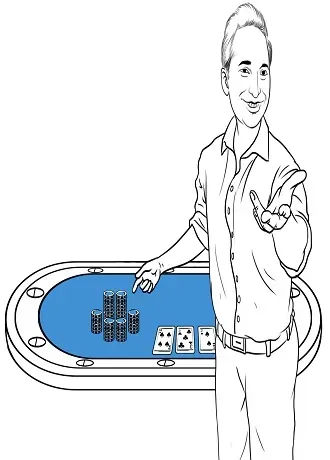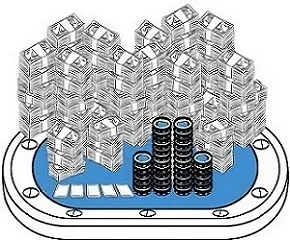Increasing Mental Endurance
One of the major advantages of playing poker online is its constant availability. However, it's important to recognize that you don't have infinite mental stamina for continuous play. In the previous chapter, I discussed how to identify your ideal energy level. This chapter will guide you in sustaining that energy for a longer duration.
Improved mental stamina is particularly beneficial when you're aiming to increase your earnings without advancing to higher stakes or when managing the demanding later phases of an extensive multi-table tournament. tournament like the Multi Table Tournament that attracts thousands of players.
Moreover, enhanced endurance will bolster your poker mentality, enabling you to thrive in high-pressure scenarios, such as crucial final tables, where the strain can be immense.
Throughout my journey, I've assisted numerous players in boosting their mental endurance, allowing them to play longer and manage multiple tables simultaneously while maintaining a high performance level. The emphasis on this last point is essential, as merely playing more does not equate to improved skill. poker Here are effective steps that have proven successful in developing greater mental resilience:
- Take small steps
- Rest
- Improve your C-game
Take Small Steps
After observing my poker instructional video, consider this: it signifies a 100% increase! Picture yourself attempting to lift 100 kilograms at the gym when your current capacity is 50. Or setting out to complete a 10-kilometer run after only having finished a 5-kilometer distance before. While I'm not suggesting it's impossible, sustaining such a drastic shift will be challenging. If you persist in pushing your limits in lifting, running, or playing more poker than usual, you risk injury. From a mental standpoint, this means you might deplete your usual energy reserves. burn Consequently, you could find it difficult to concentrate, feel sluggish, and lack enthusiasm. You might even perceive yourself as being lazy when in fact you’ve simply exhausted your mental resources and require rest to fully recuperate.
Start with the 50-Hour Poker Package

Players aiming to make significant strides in their poker mental game often exhibit fluctuating play hours. For instance, one month they might clock in 80 hours, followed by only 25 hours the next month, then rebound to 75 hours, only to drop to 20 hours subsequently. While this cycle isn’t inherently problematic, it does indicate an opportunity for a more stable approach.
Analyzing this scenario, the average play time over four months amounts to 50 hours. This reflects a manageable amount of play per month. Starting with this baseline of 50 hours, aim to gradually increase this over time. A monthly increase of about 10-20% is usually sustainable. For your first month, set your sights on playing between 55 and 60 hours. The following month, strive for 60 to 72 hours, and continue this trend. Building your endurance with a sound poker mentality doesn't take long, but if you attempt to push a consistent 20% increase, consider taking a month to stabilize at your previous goal after three or four months to reinforce your progress. general strategy applies when adding more tables–This approach serves as an excellent poker strategy, particularly for those engaged in Texas Hold’em.
To give you a clearer picture of what this might look like in practice, here are some poker mental workout suggestions. Suppose you play an average of 20 days in a month, dedicating 2.5 hours each day, with a goal of increasing your total by 10 hours that month. In a scenario aimed at increasing time while also adding tables, you could try extending your play by 5 hours while introducing an extra table alongside the four you typically play.
| Increasing Time | Increasing Time & Tables |
| Day 1: Increase by 15 minutes | Day 1: Increase by 30 minutes |
| Day 2: Increase by 15 minutes | Day 2: Increase by one table |
| Day 3: Off day | Day 3: Off day |
| Day 4: Increase by 30 minutes | Day 4: Increase by 30 minutes |
| Day 5: Off day | Day 5: Off day |
| Day 6: Increase by 30 minutes | Day 6: Increase by one table |
| Day 7: Off day | Day 7: Off day |
| Day 8: Increase by 30 minutes | Day 8: Increase by one table |
| Day 9: Increase by 30 minutes | Day 9: Increase by 30 minutes |
| Day 10: Off day | Day 10: Increase your session by 15 minutes and add one more table. |
| Day 11: Increase by 30 minutes | Day 11: Off day |
| Day 12: Increase by 45 minutes | Day 12: Increase by 30 minutes |
| Day 13: Increase by 30 minutes | Day 13: Again, increase your session by 15 minutes and add another table. |
| Day 14: Off day | Day 14: Off day |
| And so on… | And so on… |
Keeping a Detailed Poker Log
If you decide to take this seriously, keep track of your progress Using an Excel spreadsheet to monitor your progress—an invaluable tip for any poker player, whether you're just starting out or are a seasoned pro. In this spreadsheet, track your targeted volume or number of tables played against your actual performance and make notes about the mental challenge you faced during each session. This last aspect is crucial as it provides context to your numeric goals. For example, on Day 4 of your increased session schedule, if you encounter significant hurdles and find yourself in tough decision-making spots, perhaps your goal was to extend your playing time by another 30 minutes, but feeling slightly tilted and fatigued may lead you to quit after just 2.5 hours. Document the reasons for not meeting your goal in your notes, as this will help you identify recurring patterns that impede your ability to push for increased volume. poker strategy At times, it's not simply a matter of wanting to enhance your endurance that obstructs your progress; it can be related to psychological hurdles, life circumstances, or other factors that affect your mental game. If you are grappling with issues like tilt control, fear, or anxiety, these complications will likely surface more frequently when you challenge yourself by increasing your playtime or the number of tables you manage. If you persist in pushing your endurance limits without addressing these concerns, they can worsen, necessitating additional recovery time. Tackling these mental obstacles is essential for reaching your endurance goals, and they might have been significant factors in your inability to achieve them previously.
Just as you perform workouts in the gym which involve straining muscle fibers, sending signals to your body regarding the weights you'd like to lift, the subsequent rest and recovery is what strengthens those muscles. If you neglect to allow your body the necessary recovery time and continue to exert yourself daily, you will inevitably find yourself weakened. The same principle applies to your mental state when striving to enhance your cognitive capacity.oWhether your objective is to extend your session duration or increase the number of tables you play, remember to adhere to these mental strategies that promote a healthy balance between intensive activity and necessary rest. I've previously mentioned various strategies that you can incorporate into your approach in the chapteryouClear your mind before starting your poker session confidence problems and in other strategy articles found in this guide. Make sure to review these strategies and integrate them into your overall plan.
Rest
Methods to Enhance Your Poker Stamina
The ongoing access to online poker is one of its many perks. Decluttering Your Mind mastering corrections for your C-game. Remember, your C-game entails the most significant errors or weaknesses present in your play. While you may be well aware of the necessary adjustments, unless you've fully mastered them, they won't automatically come into play.
Improve Your C-game

which will assist you in focusing on executing those crucial plays effectively. As you increasingly implement these corrections, your C-game will gradually improve, saving you valuable mental energy. Jared Tendler, MS, LMHC, is a licensed therapist with a specialized focus on sports psychology and is recognized as an authority on the mental components of poker. With nearly a decade of experience coaching players, he has collaborated with over 500 individuals from more than 45 nations, including many elite players. Additionally, he is the author of two best-selling works on the subject, including Jared Tendler - Expert on the Poker Mental Game
Jared Tendler, MS, LMHC, is a licensed therapist specializing in sports psychology and recognized for his expertise on the mental aspects of poker. With nearly a decade in coaching, he has worked with over 500 players from more than 45 countries, including many world-class competitors. He is also the author of two well-regarded books on this topic, The Mental Game of Poker 1 and 2 [add link to our book review section]. poker strategy guide.
888poker-EGR-logo-Mobile-Header-2022-white
Virtual Global Digital Services Limited and VDSL (International) Limited are licensed through the Gibraltar Licensing Authority and governed by Mental Game of Poker 1 and Poker 2.